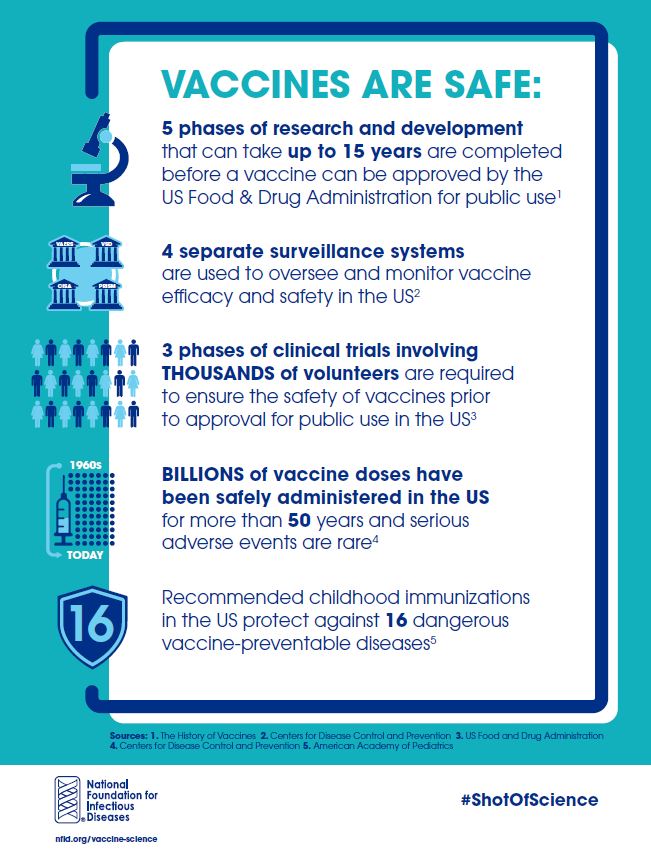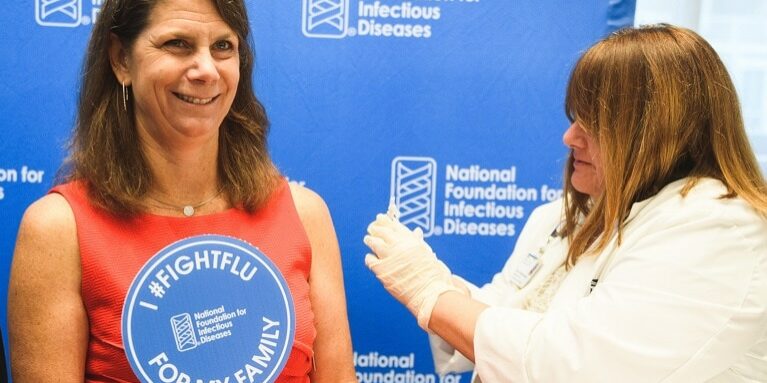
Special thanks to NFID Director Kathleen M. Neuzil, MD, MPH, Director of the Center for Vaccine Development and Global Health at the University of Maryland School of Medicine, for this guest blog post answering questions about COVID-19 vaccine safety. Neuzil is also co-leading vaccine testing for the COVID-19 Prevention Network.
Q: What mechanisms are in place to ensure that COVID-19 vaccines are safe and effective?
A: Multiple mechanisms exist to ensure the safety and efficacy of vaccines in the US. Before a clinical trial can even begin, there are rigorous guidelines and international ethics standards that must be met, and all clinical trials are overseen by independent safety monitoring boards.
The Food and Drug Administration (FDA) has extensive requirements for licensure of a new vaccine, including independent review by a panel of expert advisors. After a vaccine is licensed, FDA and the Centers for Disease Control and Prevention (CDC) work with healthcare professionals to monitor the safety of vaccines, including any adverse events that were not identified in pre-licensure study trials.
In the US, we never stop monitoring the safety of a vaccine…
Q: How are those mechanisms working in the context of Operation Warp Speed? What steps are researchers and regulators taking to safely accelerate vaccine trials for COVID-19?
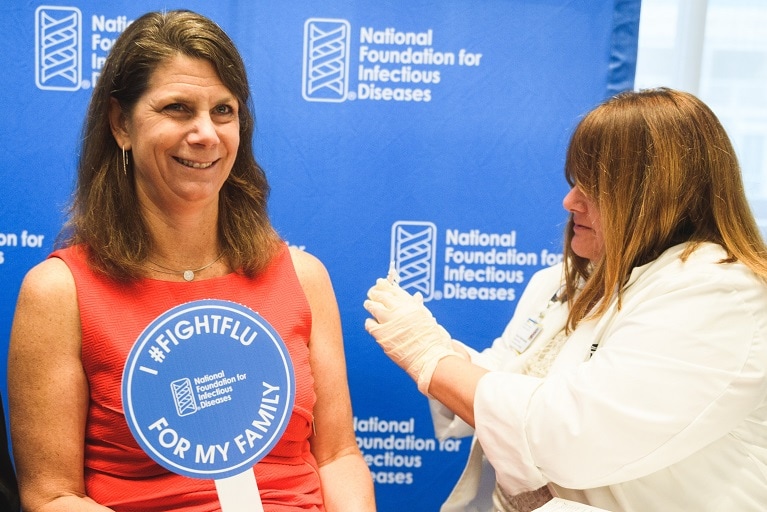 A: Acceleration is possible because of science, resources, and assuming success. Ordinarily, vaccine development begins in the preclinical stage—with studies in the laboratory and in animals. Only when there is scientific proof of concept and confidence in safety do the vaccines move to clinical testing. This is a three-phase process starting with small groups of healthy adults, gradually expanding to people who have similar characteristics as those for whom the new vaccine is intended, and then expanding to thousands or more. These processes ordinarily take several years.
A: Acceleration is possible because of science, resources, and assuming success. Ordinarily, vaccine development begins in the preclinical stage—with studies in the laboratory and in animals. Only when there is scientific proof of concept and confidence in safety do the vaccines move to clinical testing. This is a three-phase process starting with small groups of healthy adults, gradually expanding to people who have similar characteristics as those for whom the new vaccine is intended, and then expanding to thousands or more. These processes ordinarily take several years.
With COVID-19 vaccine development, we assume every step will be successful. Before one step ends, we start preparing for the next step. All of this is done without compromising safety. Further, work done on vaccines for SARS or MERS (coronaviruses that we have previous experience with) allowed us to quickly move through early phases and proceed to clinical trials.
There are many deliberate points along the way to look at COVID-19 vaccine safety data. Usually, the sponsor of a study for a new vaccine chooses the independent scientific experts who will comprise the data and safety monitoring board (DSMB) that monitors for safety concerns and signs of success. All phase 3 clinical trials of COVID-19 vaccine candidates supported through Operation Warp Speed are overseen by a harmonized independent DSMB, acting across all of the trials for all of the sponsors. This helps ensure consistency, independence, and expertise, and it allows safety signals from one trial to inform another trial in real-time.
Vaccines are held to extremely high safety standards—even more stringent than the safety standards for treatments—because vaccines will be given to healthy populations.
Q. Do you have any concerns about polls indicating that a large percentage of the US public do not plan to get vaccinated for COVID-19?
A. The polls tell us we have work to do in gaining public confidence. But it is important to keep in mind that polls conducted today are essentially asking people to make a decision with very limited information.
We can learn a lot from our experiences with influenza (flu). With both flu and COVID-19, many young people feel invincible and do not heed public health advice—and it is among this population that COVID-19 is spreading. With flu, we have gained traction with the message that getting vaccinated not only protects you directly, but also can help protect those around you, including individuals who may be more vulnerable to serious complications. If people understand the potential benefits to others, it may change attitudes. All of this is predicated upon building public confidence in vaccine safety. If we can get people to understand the scrutiny and high safety standards for vaccines, some of those opinions may change and hopefully, we will increase vaccine uptake.
Q. Communities of color have been disproportionately impacted by COVID-19. How should we prepare for a COVID-19 vaccination campaign and engage with these communities?
A. It has to start with the vaccine trials, which is important for many reasons. The historic distrust within communities of color is understandable given the past history of medical research. These challenges will be even more apparent and more difficult during the pandemic when we need to move quickly. Conversations need to start now and have already started, to some degree, within the COVID-19 Prevention Network, which is working to prioritize the participation of minority communities in clinical trial enrollment. The dialogue has begun and must continue, in order to build vaccine acceptance among communities of color, who are disproportionately affected by both COVID-19 and flu.
Q. What would you say to someone who is hesitant to get vaccinated against COVID-19 because of concerns about vaccine safety?
A. Data and facts are the most compelling selling point. Right now, tens of thousands of people have received COVID-19 vaccines in clinical trials that are being monitored closely. A percentage of those people will get sick whether or not they received a vaccine. What the DSMB watches for is to ensure that the number of medical events is similar in the vaccine and the placebo groups. If an unusual illness occurs, FDA may stop the trial for a period of time to get all of the information and determine if the vaccine is, or is not, the cause. This is a continuous process for all of these trials.
Once a trial concludes and a vaccine is licensed, the safety data are publicly available. At that point, a strong recommendation from a trusted healthcare professional really carries weight. Community leaders are also important—their confidence will translate to greater public confidence in vaccines.
Q. Can people get reinfected with COVID-19? How long does immunity last?
A. Note that we only identified this disease in December 2019; it is difficult to know the duration of immunity until additional time passes. Things are moving fast enough now that anything we learn about the disease and its prevention is relatively short term. Animals studies have shown that a first coronavirus infection protects against second infection—that is good news, but it is based on reinfection within weeks or 1-2 months. We will need to follow participants in the trials to determine whether additional doses may be needed to boost immunity. As with all vaccines and diseases, this will be monitored carefully, and the strategy will be informed by what we learn about natural immunity. We would hope immunity would last for years, but it is impossible to know that this soon.
Any closing thoughts?
A. We need to extrapolate what we have learned from years of experience with flu and apply those learnings to COVID-19. And we must think about both ourselves and those around us when making a decision about whether to get vaccinated, wear a mask, and follow social distancing recommendations.
Share Your Thoughts
Do you plan to get vaccinated against COVID-19 once vaccines become available? Weigh in via the NFID website Reader Poll and share any additional thoughts in the comments section below.
For current information on COVID-19, visit www.coronavirus.gov and www.nfid.org/coronavirus.
To join the conversation and get the latest news on infectious diseases, follow NFID on Twitter using the hashtags #COVID-19 and #StopTheSpread, like us on Facebook, follow us on Instagram, visit us on LinkedIn, and subscribe to receive future NFID Updates.
Related Posts
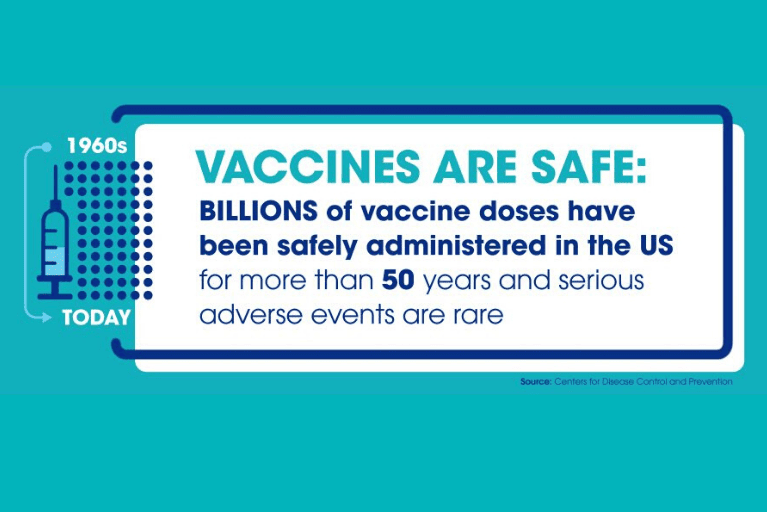
Evaluating Vaccine Safety
As new vaccines for COVID-19 are rolled out, and booster and eligibility recommendations expand, now is an opportune time to highlight the multiple, robust, transparent systems that apply to all vaccines …
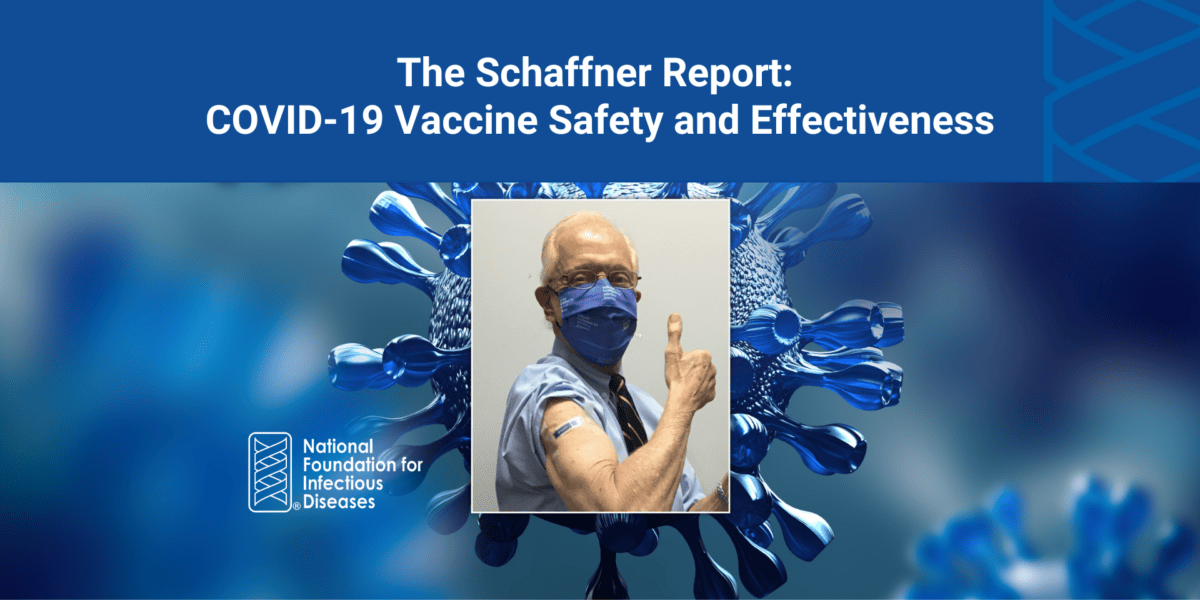
Schaffner Report: COVID-19 Vaccine Safety and Effectiveness
NFID Medical Director William Schaffner, MD, answers timely questions about the latest data on COVID-19 vaccine safety and effectiveness

